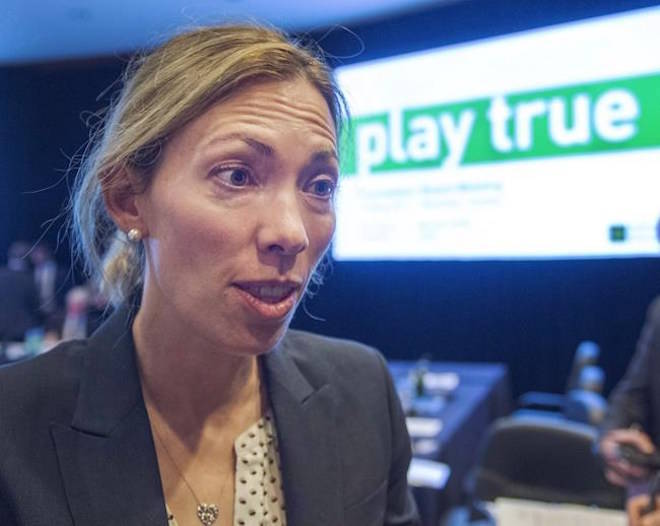Canadian cross-country skier Devon Kershaw was floored by the International Olympic Committee’s crackdown on Russia because he had zero faith anything would happen.
The IOC punished Russia on Tuesday for the widespread evidence of state-sponsored doping at the 2014 Olympic Games in Sochi, banning the country from competing in February’s Winter Olympics in Pyeongchang, South Korea.
Athletes from Russia who prove they’re clean can participate as “neutrals” without the Russian flag and anthem, the IOC said.
“I’m flabbergasted that the IOC did anything,” Kershaw told The Canadian Press from Norway. “I mean, look at their track record.
“I’d pretty much lost all faith in the IOC.”
The three-time Olympian had led the charge for Canada’s first Olympic medal in men’s cross-country skiing for over a decade, finishing fourth in team sprint with teammate Alex Harvey at the 2010 Vancouver Games. A Russian duo won gold that year.
“Those moments that were robbed, you don’t get them back and it doesn’t feel good to sit here and talk to you and think about were they doing something like that in Vancouver, when I was fourth? Probably,” the 34-year-old from Sudbury, Ont., said.
“That stinks because that was the prime of my career. Before my facial hair was grey.”
How the IOC’s punishment of Russia will impact Canada’s medal count in Pyeongchang is unclear because of the myriad of ways this could play out.
Russian president Vladimir Putin might not allow any athletes to compete as neutrals, which equates to a boycott.
Who will be allowed to compete as a neutral has yet to be determined. Athletes already banned can still appeal to the Court of Arbitration for Sport.
No official from Russia’s ministry of sport will get accreditation for Pyeongchang and no coach or doctor found to have committed an anti-doping violation can be invited, according to the sanctions released Tuesday.
Kershaw believes Russia’s sport leaders should bear responsibility for what happened in Sochi and the subsequent fallout.
“It’s easy in Canada to point fingers and say ‘the athletes should know better’ but travel to Russia and see the living conditions these kids are growing up in,” Kershaw explained.
“They make the national team … and then they come into this incredibly corrupt system with a bunch of coaches that have been there since, I don’t know, World War II?
“They have so much power over the athletes compared to the western culture. If you speak up, you’re on the next bus to Siberia.”
Related: IOC suspends Russian Olympic committee
But Calgary curler Chelsea Carey was less forgiving. She wasn’t completely comfortable allowing Russian athletes to compete as neutrals.
“How am I supposed to be convinced that they’re clean when every day there is a new scandal about a Russian athlete from Sochi who wasn’t clean?” Carey asked at the Olympic trials in Ottawa.
“It’s tough as an athlete when you are following the rules and are doing what you’re supposed to do.
“I’m glad that there is a sanction. They certainly needed to be punished for what they did. I think that the athletes have some liability there that they’re not necessarily being held to, which is too bad.”
Former Canadian cross-country skier Beckie Scott has been an anti-doping advocate since her bronze medal in 2002 was upgraded to silver and then gold because athletes ahead of her were disqualified for doping.
The chairman of the World Anti-Doping Agency’s athletes committee says the IOC struck a balance between punishing those responsible and protecting clean athletes.
“It was the furthest they could go in terms of levelling a sanction and consequences for what became known about Russia and their doping system,” Scott said.
“The system is being punished … the conspiracy is being addressed and sanctioned and if there are clean athletes who can prove they’re clean, they still have a chance to compete.”
Six-time Olympic hockey player Hayley Wickenheiser, who was elected to the IOC athletes’ commission in 2014, aligns with Kershaw in placing the blame Russia’s sport leaders and not the athletes.
“There are no winners in today’s decision,” she said in a statement. “It is not lost on many clean athletes that Russian athletes who were part of this system may have had no choice but to comply.
“It is also commendable and important to see harsher sanctions towards officials and entourage. The evidence overwhelmingly shows the power and influence these people took to control athletes and their outcomes.”
The Canadian Olympic Committee told the IOC in October to impose “immediate and meaningful sanctions” on Russia ahead of the 2018 Winter Games.
“The Canadian team will have the confidence that they’re competing on a level playing field,” COC president Tricia Smith said Tuesday.
“This decision is critical in terms of the sanctions it took not just against the athletes, but to those who were responsible and in charge, morally and contractually.”
The Canadian government supported the IOC’s punitive measures against Russia.
Related: Athlete caught doping in 2010 Vancouver Olympic retesting
“We support the International Olympic Committee’s decision to ban Russia from participating in the 2018 Winter Games in Pyeongchang, ensuring a clean competition,” Canadian Sport Minister Kent Hehr said in a statement.
“I am confident that the IOC, the respective international sport federations and the World Anti-Doping Agency will collaborate with the Russian authorities to apply the appropriate corrective measures.”
– Canadian Press reporter Greg Strong contributed to this story.
Donna Spencer, The Canadian Press



